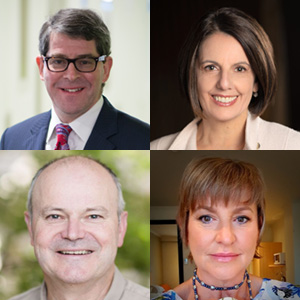Extreme events are becoming more devastating and more frequent. Communities, economies and ecosystems have increasingly less time to bounce back between them. How do we build resilience for the future? This summer’s devastating bushfires and the disruption of the COVID-19 pandemic have given Australians an alarming insight to the sustained uncertainty we will be facing under a rapidly changing climate. Mike Flattley (Royal Society of Victoria) and Anthony Boxshall (Science Into Action) invited a number of speakers to discuss how we can build resilience into our planning strategies for water, agriculture and biodiversity. Featuring David McKenzie and Claire Flanagan-Smith on the Goulburn Murray Resilience Strategy, Lauren Rickards on Climate Change and Systems Transformation, Brendan Wintle on Decision Making for Biodiversity, Briony Rogers on Preparing the Water Sector for Transition, Richard Eckard on the Transition of the Agricultural Sector, and Sarah Bekessy on Building Community Ownership and Agency in the process.
Consistent with the theme of “Possible Impossibles”, six undergraduate students presented STEM solutions to global challenges in the Let’s Torque Grand Finals for National Science Week. The finalists aimed to bridge the gap between researhcers and society by communicating innovative STEM developments to the general public. RSV Councillor Rob Gell delivered the keynote address. Coincidentally, the day of the Let’s Torque Grand Final, 22nd August, was Earth Overshoot Day, which marks the date that our demand for nature exceeds what Earth’s ecosystems can renew in a year. To Rob, conserving our remaining natural assets is a top priority. “Business as usual” simply does not work. Everyone wants things to be better, but it is difficult to find momentum to change our individual behaviours. We need a lust for change, and that is what Rob aims to inspire. With their energy, enthusiasm, and ideas, the six Let’s Torque finalists will be agents of change too.
The Victorian Parliament will partner with the Royal Society of Victoria to host a live online community forum exploring how science can help create the sort of future Victorians want.
To be held on Sunday 23 August 2020 as part of National Science Week, the Possible Impossibles online forum will be hosted by award-winning ABC journalist Natasha Mitchell.
Four scientists working at the forefront of environmental science, new technologies, medical science and space exploration will answer questions from an online audience and reflect on the way science can respond to community demands to improve people’s lives.
“The Victorian Parliament has been finding new ways of connecting with people online,” said Speaker of the Legislative Assembly Colin Brooks.
“This event is a way for people to contribute to a broader discussion about what the future should look like and how scientific exploration can help us get there,” he said.
The UNFCCC Paris Agreement to combat climate change requires commitment and action towards a sustainable, low carbon future. The target set was to limit global warming to 1.5°C – and we are only 0.4°C away. Global carbon emissions peaked in 2019 but have already dropped down this year due to limited air travel and other factors. While the circumstances that brought about these changes are less than ideal, it is a start and hopefully lays the foundation for sustained reductions.
The future climate is in our hands – our actions now will decide that future. Energy production remains the primary driver of greenhouse gas emissions, followed by agriculture, forestry and other land uses, then industry and transport. According to climate scientist Professor David Karoly, countries in the Southern Hemisphere are expected to experience the largest economic impacts of global warming, and it is therefore imperative that Australia takes leadership and responsibility for making change.
According to Dr Tyson Yunkaporta, we live in a ‘Dynamic Universe – because of the diversity within it.’ Tyson belongs to the Apalech Clan in far north Queensland and is a senior lecturer in Indigenous Knowledges at Deakin University. Indigenous knowledge is a dialogue – it’s the yarns, carvings, songs, and dances that change depending on the relationship of the people who are sharing it, where they are, and where they are from. With so many cultures, stories, and points of view, stories of the sky change according to where you stand. ‘Truth is not an empirical thing, but an aggregate of stories and diversity.’ What Westerners call a meteor represents the eye of an evil spirit or death to many Aboriginal groups across northern Australia. Cultural astronomer A/Prof Duane Hamacher has felt privileged to learn how meteors and meteorites are incorporated into Indigenous knowledge systems by Aboriginal and Torres Strait Islander elders around Australia.








